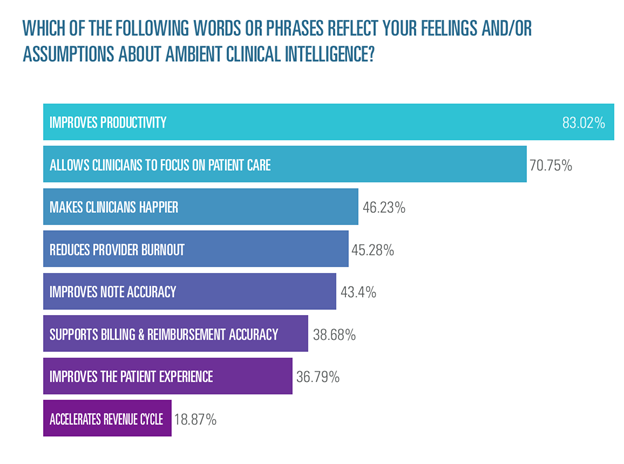Ambient intelligence (AmI) augments human capabilities to make our lives easier. It’s becoming more pervasive in our homes and workplaces. The applications are many, especially in healthcare. In healthcare, a type of AmI, ambient clinical intelligence (ACI), is used to efficiently diagnose and monitor patients, detect and predict illness, accelerate drug development, improve the patient experience, and expand access to care. The technology is providing time savings, and that time savings is having a significant impact on operational efficiencies and improved experiences for all.
Editors note: This blog was last updated January 31, 2024.
This blog was contributed by Dr. Jared Pelo, co-founder at Bionic Health.
Ambient intelligence (AmI) augments human capabilities to make our lives easier. It’s becoming more pervasive in our homes and workplaces. The applications are many, especially in healthcare.
It works by utilizing several technologies including Artificial Intelligence, Big Data, Internet of Things (IoT), Pervasive-Ubiquitous Computing and Networks and Human Computer Interaction (HCI). Some common examples of ambient intelligence are Alexa, Echo and Google Home.
In healthcare, a type of AmI, ambient clinical intelligence (ACI), is used to efficiently diagnose and monitor patients, detect and predict illness, accelerate drug development, improve the patient experience, and expand access to care.
What is ACI
ACI is offsetting the most pressing challenges in healthcare today such as burnout, physician shortages, physician and patient dissatisfaction and underperforming financial outcomes by applying the technology to clinical documentation. The application of this transformational technology utilizes artificial intelligence (AI) and natural language processing (NLP) to automatically document care. It securely listens and captures the natural, clinician-patient encounter conversation unobtrusively, and turns that conversation into a clinical note for the clinician’s review and signature in the electronic health record (EHR).
The technology is providing time savings, and that time savings is having a significant impact on operational efficiencies and improved experiences for all.
ACI expectations
In late 2020, Modern Healthcare and Healthcare Innovation surveyed healthcare executives to gauge their opinions and perceptions about ACI documentation technology and explore how it will impact the patient experience, physician satisfaction, quality of care and financial outcomes.
In the Modern Health care survey, when asked about the potential for ACI, 72 percent said it would allow clinicians to focus on patient care, 66 percent said it would improve productivity, and 64 percent said it would improve note accuracy.
Leaders expressed confidence in ACI’s ability to improve clinical outcomes, with 76 percent of respondents agreeing that it will positively impact the quality of care at their organization. When care is accurately documented, errors can be avoided, and patient-provider engagement is improved, enabling patients to better adhere to treatment plans and participate in their care.
When asked about how ACI could address leaders’ priorities, their top three responses were:
- The need to allow clinicians to focus more on patient relationships and improve patient satisfaction (65 percent)
- Note quality and accuracy (58 percent)
- Ease of use/Improving clinician productivity (both tied at 51 percent)
Of particular note in the survey results:
81% of leaders believe ambient clinical intelligence could have a positive impact on timely and accurate reimbursement.
73% of leaders believe ambient clinical intelligence could improve the quality of care at their organization.
When asked which of the following descriptions match their feelings or assumptions about ACI, the Healthcare Innovation survey respondents agreed with the following characteristics about the technology:

How ACI for documentation helps
The administrative burdens of managing patient care and meeting increasing compliance and documentation requirements are frustrating clinicians and interfering with their ability to practice medicine. Too often they spend more time documenting care than delivering it—with their gaze fixed more on a screen and less on the patient.
By reducing administrative burdens and the associated time savings, ACI for documentation:
- Improves the patient experience
- Enables more clinician facetime, focus and communication
- Increases access to care
- Decreases wait times
- Boosts physician satisfaction
- Reduces burnout for a better work/life balance
- Enables physicians to practice at the top of their license bringing the joy back into practicing medicine
- Delivers operational efficiencies and financial outcomes
- Increases throughput and incremental services
- Improves physician recruitment and retention and patient leakage
- Helps with time management for tasks such as messages, refills and calls
- Enhances documentation quality
- Captures the full patient story improving quality of care
- Enables appropriate coding for accelerated reimbursement and decreased denials
Real-world outcomes
Now that ACI for documentation has been in actual use for about three years, how is it stacking up to expectations?
Nuance’s ACI documentation solution, the Dragon Ambient eXperience copilot (DAX copilot) is surpassing expectations. A survey conducted by Nuance revealed that DAX copilot is improving operational efficiencies by saving 7 minutes per encounter, reducing documentation time by 50%. It’s improving physician satisfaction – 93% say they would be disappointed if they no longer had access to DAX copilot. Nine out of ten would recommend it and 79% say it’s improving documentation quality. Patients are benefitting too. In fact, 83% say their physician is more personable and conversational and 81% say their physician is more focused since using DAX copilot.
It’s in wide use today by thousands of physicians in every type and size of healthcare organization and is receiving high accolades from those using it. Dr. Monte Hunter, from Augusta University in August, GA lauded it as “game changing.” Dr. Lance Owens at the University of Michigan Health-West said, “it’s a life preserver for healthcare. This has been a huge game-changer for us and our quality of life.” Dr. Mokarroma Sharmin at WellSpan Health in Pennsylvania said, “It has improved our patient experience and quality of care. Our patients feel better connected with us, we are talking to them personally, we are there for that moment.”
Not all ACI solutions deliver the same outcomes or provide the same benefits, however. The accuracy of the AI is dependent on the data that fuels it, and you need a lot of data so it can learn. And because ACI solutions work in conjunction with electronic health records (EHRs), having close partnerships with EHR companies is essential.
Leveraging innovation to advance care
This is just the beginning of the benefits that Nuance’s DAX copilot solution will bring. In the long term, it will grow into an interconnected ACI clinical ecosystem offering a variety of sophisticated ambient skills and proactive
intelligence making it the ideal solution for physicians that want to leverage innovation to advance the level of care they provide. These capabilities, fueled by Artificial Intelligence (AI) algorithms and a sophisticated set of technologies, can be seamlessly deployed to clinical teams to address healthcare’s primary operational and clinical challenges.
Ambient clinical intelligence is launching healthcare into a more sustainable future, returning the patient-physician relationship to the forefront of the care delivery experience. DAX copilot is the superior automated documentation technology: efficient, comprehensive, accurate—and transformative.
Strong unequaled partnerships for strong growth
Nuance is the leader in ACI. With over 1,800 R&D employees, 3000+ terabytes of data, and 2,270 patents, Nuance builds its own technology without relying on third parties. And Nuance has strong relationships with EHR companies with joint development initiatives.
As a Microsoft company, Nuance DAX copilot is uniquely positioned to scale. With Microsoft’s best-in-class infrastructure renowned for its global scale, world-class security, powerful compute capabilities and first-of-their-kind industry-specific clouds, we will be able to deliver even better solutions that help our customers achieve important outcomes and redefine success.






